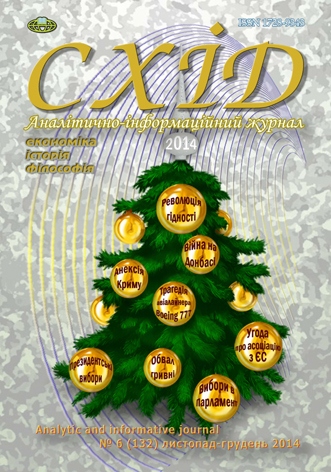Interpretations of the concept of faith in modern Catholic theology
DOI:
https://doi.org/10.21847/1728-9343.2014.6(132).36503Keywords:
Catholic theology, faith, metaphysicsAbstract
The paper identifies consistent interpretations of the phenomenon of faith, based on learning of the most influential paradigms in modern Catholic theology. It is indicated in particular that Catholic theology of the 19th-early 21st centuries developed a metaphysical concept of faith as acceptance of dogmatic theology theses by mind. All scientific and philosophical rationality has then reduced to judicious metaphysics, whereas the possibility of intuitive or personalistic interpretations of faith was denied. Since the mid-20th century those metaphysical provisions on rationality and faith have been existentially interpreted, which was particularly brilliantly done by Pope John Paul Pavel II in the encyclopedia 'Fidesetrati'.
Pope John Paul Pavel II held to a pre-modern concept of faith but introduced existential motives to his concept for the sake of a new proof of metaphysical concepts of faith, rationality and a path to know God. At the same time, Pope tended to pass on to a new paradigm, a pre-postmetaphysic and postmodern dialogical concept of faith, which was however completely shaped in creativity of another Catholic theologian - H.U. von Balthasar and within transcendental Thomism of K. Rahner.
Downloads
References
Christian doctrine. Dogmatic texts of the Magisterium III-XX centuries (2002), Publisher St. Peter, St. Petersburg, 550 p. (rus).
Iohannes Paulus II Pāpa (2003), Fides et ratio, in: Works, Vol. II, Publisher Franciscans, Moscow, pp. 205-307 (rus).
Balthasar Hans Urs von (2009), Die Wahrheit ist symphonisch, St. Thomas Institute, Moscow, 152 p. (rus).
Balthasar Hans Urs von (1997), Worthy of belief only love, Moscow, 124 p. (rus).
Gilson Étienne (1995), Le Philosophe et la Théologie, Moscow, 192 p. (rus).
Levchenko T. N. (2011), Filosofska dumka-Sententiae, Special Issue, № 2, Vinnytsia, pp. 119-127, available at: http://www.academia.edu/8233205/Sententiae._ BA_II._-_2011 (ukr).
Küng Hans (2000), Great Christian Thinkers, St. Petersburg, 442 p. (rus).
Kolodnyy A. M. (2005), Premodern, modern, postmodern in the context of the history of Christianity, Ukrainian Religious, № 3 (35), pp. 5-33, available at: http://dspace.nbuv.gov.ua/bitstream/handle/123456789/43804/2005_35_1.pdf?sequence=1 (ukr).
Chornomorets Yu. P. (2013), Filosofska dumka-Sententiae, Special Issue, № 3, Vinnytsia, pp. 74-88 (ukr).
Khrystokin H. V. (2007), Neopatrystyka as a paradigm of modern Orthodox theology, available at: http://theology.in.ua/ua/bp/theologia/contemporary/37850/ (ukr).
Rowland T. (2008), Ratzinger's Faith. The theology of pope Benedict XVI, Oxford University Press, Oxford, 214 p. (engl).
Rowland T. (2003), Culture and the Thomist Tradition: After Vatican II, Routledge, 208 p. (engl).
Kerr F. (2003), After Aquinas: versions of Thomism, Blackwell Publishers, Oxford, 254 p. (engl).
Rahner Karl (2006), The foundation of faith. Introduction to Christian Theology, Moscow, 662 p. (rus).
Downloads
Published
How to Cite
Issue
Section
License
Copyright (c) 2015 Tetiana Levchenko

This work is licensed under a Creative Commons Attribution-NonCommercial-NoDerivatives 4.0 International License.
1. Authors bear responsibility for the accuracy of facts, quotations, numbers and names used.
2. Manuscripts are not sent back.
3. The publisher does not always agree with the authors' opinion.
4. The authors reserve the right to authorship of the work and pass the first publication right of this work to the journal under the terms of a Creative Commons Attribution-NonCommercial-NoDerivatives 4.0 International License. This license allows others to distribute (copy) the published work for non-commercial purposes, provided there is mandatory attribution to its authors and a link to the first publication in our journal.
5. The authors have the right to conclude separate supplement agreements that relate to non-exclusive work distribution in the form in which it has been published by the journal (for example, to upload the work to the online storage of the journal or publish it as part of a monograph), provided that the reference to the first publication of the work in this journal is included.

